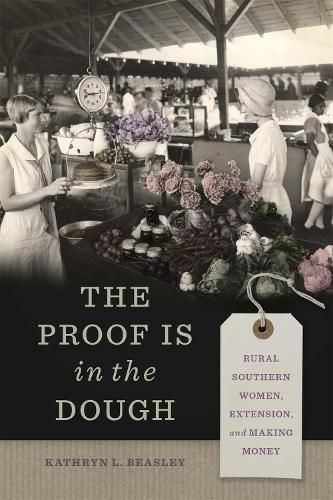Readings Newsletter
Become a Readings Member to make your shopping experience even easier.
Sign in or sign up for free!
You’re not far away from qualifying for FREE standard shipping within Australia
You’ve qualified for FREE standard shipping within Australia
The cart is loading…






The Proof Is in the Dough examines how rural white and African American women in Alabama and Florida used the Cooperative Extension Service's home demonstration programming between 1914 and 1929 as a means to earn extra income. Kathryn L. Beasley explores an area of rural women's history that has not been closely examined-that is, how rural American women involved with home demonstration used the skills they learned as a way to better themselves economically. Furthermore, Beasley traces how this extra income allowed these women to shape their own producing and consuming habits.
While most home demonstration programming during the Progressive Era and 1920s focused on ways to save money-among other objectives-rural women in Alabama and Florida used different strategies to earn more money and gain some economic independence. Beasley's research shows how Alabama and Florida's rural women exercised their own determination and resourcefulness to create ways to economically sustain themselves by using food, tangible items, handicrafts, small businesses, and more to their advantage.
However, while there were similarities in how these rural women earned extra money, the states in which they lived differed in important agricultural ways. Florida offered a wider variety of growing and environmental seasons and, as a result, a larger diversity of crops. By taking a comparative approach-both Florida versus Alabama and Black versus white-Beasley details the unique and innovative ways that rural southern women applied their considerable agricultural and domestic skills to improve their lives and the lives of their families. In so doing, she also reveals how disposable income helped establish ideas of empowerment and financial independence in the years before the economic struggles of the 1930s.
$9.00 standard shipping within Australia
FREE standard shipping within Australia for orders over $100.00
Express & International shipping calculated at checkout
The Proof Is in the Dough examines how rural white and African American women in Alabama and Florida used the Cooperative Extension Service's home demonstration programming between 1914 and 1929 as a means to earn extra income. Kathryn L. Beasley explores an area of rural women's history that has not been closely examined-that is, how rural American women involved with home demonstration used the skills they learned as a way to better themselves economically. Furthermore, Beasley traces how this extra income allowed these women to shape their own producing and consuming habits.
While most home demonstration programming during the Progressive Era and 1920s focused on ways to save money-among other objectives-rural women in Alabama and Florida used different strategies to earn more money and gain some economic independence. Beasley's research shows how Alabama and Florida's rural women exercised their own determination and resourcefulness to create ways to economically sustain themselves by using food, tangible items, handicrafts, small businesses, and more to their advantage.
However, while there were similarities in how these rural women earned extra money, the states in which they lived differed in important agricultural ways. Florida offered a wider variety of growing and environmental seasons and, as a result, a larger diversity of crops. By taking a comparative approach-both Florida versus Alabama and Black versus white-Beasley details the unique and innovative ways that rural southern women applied their considerable agricultural and domestic skills to improve their lives and the lives of their families. In so doing, she also reveals how disposable income helped establish ideas of empowerment and financial independence in the years before the economic struggles of the 1930s.